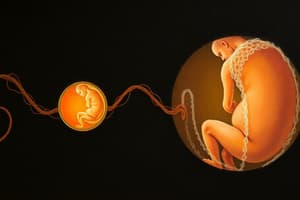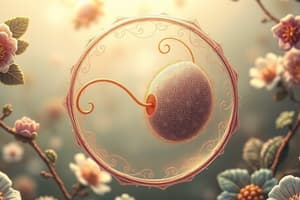Podcast
Questions and Answers
What is formed when sperm fertilizes the egg?
What is formed when sperm fertilizes the egg?
- Foetus
- Embryo
- Zygote (correct)
- Ovum
Which structure connects the foetus to the mother and provides essential nutrients?
Which structure connects the foetus to the mother and provides essential nutrients?
- Placenta (correct)
- Oviduct
- Amniotic fluid
- Umbilical cord
How long does an average menstrual cycle last?
How long does an average menstrual cycle last?
- 30 days
- 28 days (correct)
- 35 days
- 21 days
What protects the developing foetus during pregnancy?
What protects the developing foetus during pregnancy?
What is the typical duration of pregnancy?
What is the typical duration of pregnancy?
Flashcards
Fertilization
Fertilization
The process where sperm meets egg to create a zygote.
Menstrual cycle
Menstrual cycle
A monthly cycle, lasting about 28 days, that prepares the uterus for fertilization.
Ovaries
Ovaries
Glands that produce female sex cells (ova/eggs).
Placenta
Placenta
Signup and view all the flashcards
Pregnancy
Pregnancy
Signup and view all the flashcards
Study Notes
Fertilisation and Embryo Development
- Fertilisation occurs when sperm and egg cells meet
- Male sex cells produce sperm
- Female sex cells produce ova
- Ovaries produce eggs
- Eggs travel through the oviduct
- Eggs are fertilised in the uterus
- Fertilised egg develops into an embryo
- Embryo develops into a foetus
- Pregnancy lasts around 9 months
- The placenta provides oxygen and nutrients to the developing foetus
Menstrual Cycle
- The menstrual cycle is a 28-day cycle
- The uterine lining sheds, known as menstruation
- The cycle prepares for a possible pregnancy
- Ovulation occurs in the middle of the cycle
- This is when an egg is released from the ovary into the fallopian tube
- If fertilisation does not occur, the egg is lost
Pregnancy
- Pregnancy lasts approximately 9 months
- Foetal development occurs within the uterus
- Protection and nutrients are provided to the embryo
- Placenta provides nutrients to the foetus
- Amniotic fluid cushions and protects the developing foetus
- Umbilical cord connects the foetus to the placenta
Studying That Suits You
Use AI to generate personalized quizzes and flashcards to suit your learning preferences.





